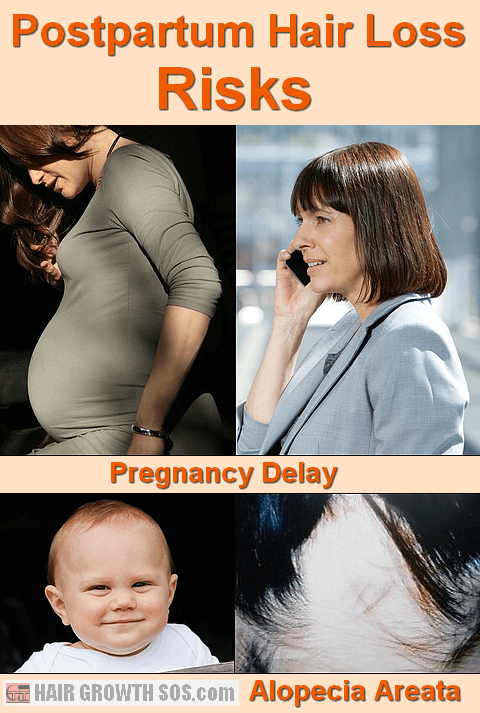- Home
- Causes of Hair Loss
- Postpartum Hair Loss
What Can You Do About Postpartum Hair Loss?
By Paul Taylor
Suffering hair loss after pregnancy? Postpartum hair loss can be associated with the following conditions:
- Thyroiditis
- Telogen effluvium
- Alopecia areata
This page discusses all three types, another risk factor (pregnancy delay), and suggests what you might be able to do about it all.
Pregnancy - it’s a quite an ordeal isn’t it? Not only do you get morning sickness, put on loads of weight, change shape and suffer all sorts of aches and pains, but when it’s all over, you might suffer hair loss too!
The possible underlying reasons for postpartum hair loss can include:
1. Hormone fluctuations.
2. Changes to your immune system.
3. Stress levels through the roof!
So if you’ve just had a baby and have now noticed you’ve started
losing loads of hair, consider whether one or more of the following risk factors and conditions might be the culprit:
1. Pregnancy Delay
More women today delay having children until they're much older. This increasing trend reflects the preference many women now have to concentrate on a career first and raising a family second.
But, unfortunately, this delay can hinder the female body's ability to restore normal hormone balance following the upheaval of pregnancy and childbirth.
This is basically because an older body is more likely to have a slower metabolism or inadequate hormone levels than a younger, healthier body.
So, what consequences can this have on your hair?
Basically, during pregnancy female hormone levels rise, and this usually encourages hair to grow extremely well.
But, after pregnancy, there’s a corresponding drop in female hormone levels. And this drop can then cause hair loss to develop.
And this means that, if you're older when you have a child, one of the following three disorders might be more likely to affect you, and more likely to last longer too:
2. Postpartum Thyroiditis
Postpartum thyroiditis involves inflammation of the thyroid gland, and is thought to develop following suppression of the mother's immune system during pregnancy (1).
On average, it affects about 7.5% of women some months after they've given birth, but it is usually temporary, so the body should correct itself after about a year (1).
The symptoms of postpartum thyroiditis can be quite confusing. They can include those of hyperthyroidism initially, followed by those of hypothyroidism. And the symptoms of both these disorders include hair loss (2).
To get an idea whether this could be the type of hair loss you have, it's worth examining other symptoms of hyperthyroidism and hypothyroidism: thyroid-related hair loss.
3. Postpartum Telogen Effluvium
Telogen effluvium usually causes gradual hair thinning and hair loss. It can also be called "diffuse" hair loss because it involves a general thinning spread out over the whole scalp, rather than massive hair loss or baldness in a localized region.
Women can develop telogen effluvium within the first three to six months after they’ve given birth (3).
The reason why is basically because their hormones have been thrown out of whack. Throughout a pregnancy, there’s a big rise in female hormone levels (estrogen and progesterone). And this causes the mother’s hair to grow exceptionally well.
But, once the baby has been born, her hormone levels drop back down again, and this shock to the system can then have an adverse effect, causing telogen effluvium to develop.
Any hair loss of this type should eventually subside. But that could still mean several months with hair loss, during which time, you could lose a lot of hair.
And it can last even longer if you also have androgenetic alopecia or previously had alopecia areata (see next section).
Postpartum telogen effluvium will effect most women (4). There can also be multiple causes of telogen effluvium. You can learn about these by reading: telogen effluvium.
4. Alopecia Areata
This is a very nasty type of hair loss. Severe, rapid, localized hair loss that can develop into bald spots or patches within days. So if you’ve got alopecia areata, you would definitely know about it!
This is an autoimmune disease. It can run in families and be stress-related. So, what with pregnancy and childbirth potentially being one of the most stressful events of your life, it’s hardly surprising that those women with a tendency towards this disease might experience it following pregnancy.
Similarly, if you’ve already had previous episodes of areata, your pregnancy might be just the trigger that causes a new flare-up of hair loss.
There’s no cure for alopecia areata. But obviously reducing your stress levels, and keeping them low, can only help. Although, when you’ve just had a baby, that’s probably a lot easier said than done!
Learn more about alopecia areata.
Taking Action Against Postpartum Hair Loss
I believe the techniques which restored hair regrowth for me (due to hair loss from androgenetic alopecia) should help women with postpartum hair loss too.
That’s because these techniques can stimulate the scalp follicles. So they should be able to get your hair growing normally again sooner than if you have no treatment at all.
If you just sit and wait (and hope) that your hair will suddenly start growing again the way it used to, that might mean wishful thinking for months. And fretting about your hair loss will only make it worse.
I believe taking
action is by far the best way to deal with hair loss. So, if you agree
with me, you might like to take a look at my techniques and decide
for yourself whether or not they’re worth a try:
Note: It’s important to be aware that, although my techniques might help with postpartum hair loss caused by telogen effluvium or a thyroid
condition, they probably won't do anything for alopecia areata (which is an autoimmune
disease currently without a cure).
|
Like this page? |
|


